
Treatment with ALZ-801, an investigational agent in development for Alzheimer disease, resulted in more than 40% reduction in plasma p-tau181 at the end of the 12-month analysis.

Treatment with ALZ-801, an investigational agent in development for Alzheimer disease, resulted in more than 40% reduction in plasma p-tau181 at the end of the 12-month analysis.

The associate professor of neurology and director of the Penn Epilepsy Center at the University of Pennsylvania talked about the potential of using artificial intelligence in the field of neurology as part of an upcoming session at the 2023 AAN annual meeting. [WATCH TIME: 5 minutes]

There were no observed tolebrutinib dose effect for treatment-emergent adverse events in the double-blind portion, as well as no new safety signals seen for those who crossed over in the open-label extension.

The director of the Feil Family Brain and Mind Research Institute at Weill Cornell Medicine talked about the importance of vascular health in preventing cognitive impairment as part of his presentation at the 2023 AAN annual meeting. [WATCH TIME: 6 minutes]

Rozanolixizumab has shown promising effects as a potential treatment for myasthenia gravis, as explained by high response rates on MG Activities of Daily Living and other measures.

The director of the Feil Family Brain and Mind Research Institute at Weill Cornell Medicine talked about brain health in relation to vascular health ahead of the 2023 AAN annual meeting. [WATCH TIME: 3 minutes]

The research fellow at the Neuroimmunology Clinic and Research Laboratory, Massachusetts General Hospital and Harvard Medical School, talked about his research of cell function in NMOSD to be presented at the upcoming AAN annual meeting. [WATCH TIME: 6 minutes]

The research fellow at the Neuroimmunology Clinic and Research Laboratory, Massachusetts General Hospital and Harvard Medical School, talked about having safer and more specific treatments for NMOSD that are antigen-specific. [WATCH TIME: 4 minutes]
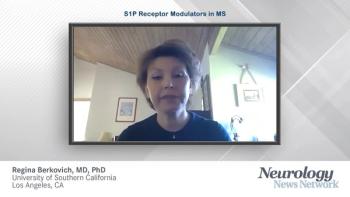
A trio of experts in multiple sclerosis exchanges their thoughts on the use of the sphingosine-1 phosphate modulating class of medicines in treating the disease. [WATCH TIME: 3 minutes]
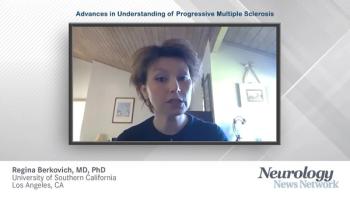
A trio of experts in multiple sclerosis exchanges their thoughts on the gains that have been made in the understanding of the progressive phases of the disease. [WATCH TIME: 3 minutes]
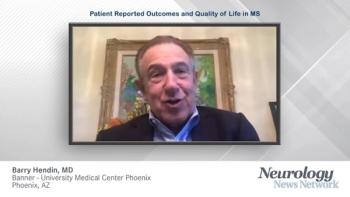
A trio of experts in multiple sclerosis exchanges their thoughts on the importance of patient-reported outcomes in the management of patients with the disease. [WATCH TIME: 3 minutes]
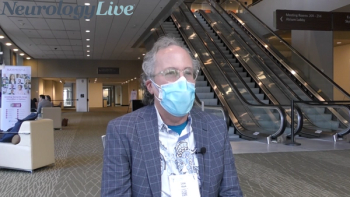
The director of the Division of Movement Disorders at the USC Keck School of Medicine discussed the early reactions behind reflex tears as a potential biomarker for Parkinson disease. [WATCH TIME: 2 minutes]

The chief medical partner of neurology, ophthalmology, and internal medicine at Genentech shared his perspective on the steps the field has taken to improve clinical trials and therapies for neurodegenerative diseases such as Alzheimer disease. [WATCH TIME: 3 minutes]
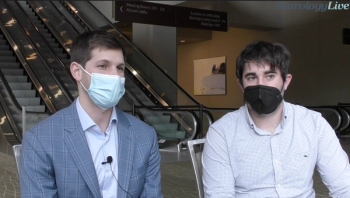
The co-CEOs and co-founders of Amylyx Pharmaceuticals discussed their immediate thoughts to the recent FDA AdComm meeting, which voted against evidence of efficacy for AMX0035 in ALS. [WATCH TIME: 3 minutes]

The director of the Division of Movement Disorders at the USC Keck School of Medicine provided insight on the next steps to justify whether reflex tears are a reliable biomarker for Parkinson disease.
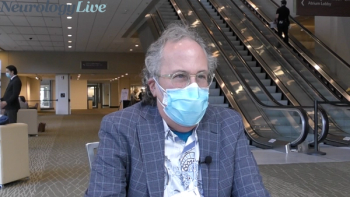
The director of the Division of Movement Disorders at the USC Keck School of Medicine discussed the efforts needed to validate tears as a biomarker in patients who don’t present with typical Parkinson disease. [WATCH TIME: 4 minutes]

The director of the Division of Movement Disorders at the USC Keck School of Medicine provided insight on the next steps in how we can expand on tears as a valuable biomarker for neurodegenerative diseases. [WATCH TIME: 4 minutes]

The director of the Division of Movement Disorders at the USC Keck School of Medicine commented on the potential of reflex tears as a critical biomarker of Parkinson disease. [WATCH TIME: 6 minutes]

Using this new methodology, 78% of patients with progressive multiple sclerosis demonstrated large treatment benefits with the siponimod (Mayzent; Novartis) on at least 1 of 4 clinical outcomes.

The professor of neurology at the University of Basel provided insight on a new methodology that allows depiction of patient profiles from baseline characteristics and their associations with individual outcomes. [WATCH NOW: 5 minutes]

Peter J. McAllister, MD, FAAN, medical director and chief medical officer, New England Center for Neurology and Headache, offered his insight into data from the phase 2 STEMTRA trial in TBI and the trends he’s observed in the field of regenerative medicine.
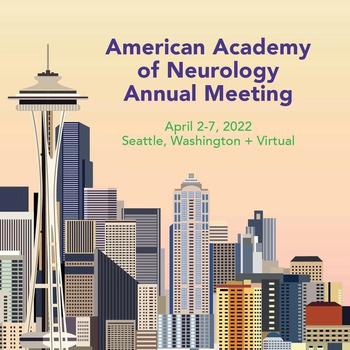
Expert clinicians offer their insight on the associations between stroke and COVID-19, treatment for traumatic brain injury, the latest on aducanumab, priorities for research in migraine, and more, from the 2022 American Academy of Neurology Annual Meeting.

Patients who switched from a twice-nightly stable regimen of Xyrem or Xywav to once-nightly FT218 reported that they preferred the new dosing schedule, along with challenges in adherence to twice-nightly dosing.

The director of the Division of Movement Disorders at the USC Keck School of Medicine discussed the phenomenon behind reflex tears and whether they can serve as a valuable biomarker for Parkinson disease.

Following respective improvements in odds of good and poor outcomes, investigators concluded that the addition of mechanical thrombectomy should be considered over best medical management practices alone.
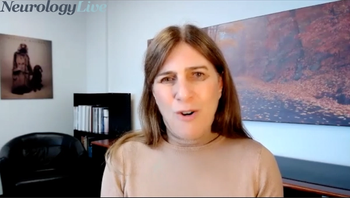
The neurologist and assistant professor at the University of Toronto discussed why elevating the voices of patients and caregivers is important to understanding and treating an individual with Alzheimer disease. [WATCH TIME: 3 minutes]

After readjusting baseline to month 12, more patients with relapsing multiple sclerosis on continuous ozanimod achieved NEDA-3 and NEDA-4 status than those on interferon ß-1a.

Despite a low percentage of patients missing work time due to their condition, a higher percentage reported impairment while working, overall work impairment, and activity impairment.

Jacqueline A. French, MD, discussed the factors that influence the challenges in treatment selection in epilepsy, and how patient conversations and comprehension of heterogeneity can help in the treatment selection process.
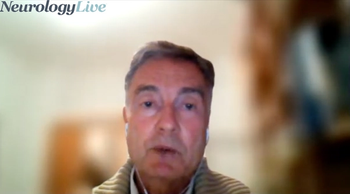
The professor of neurology at the University of Basel discussed a recent study presented at AAN 2022 on whether levels of polyunsaturated fatty acids are associated with MS disease activity or progression. [WATCH TIME: 4 minutes]